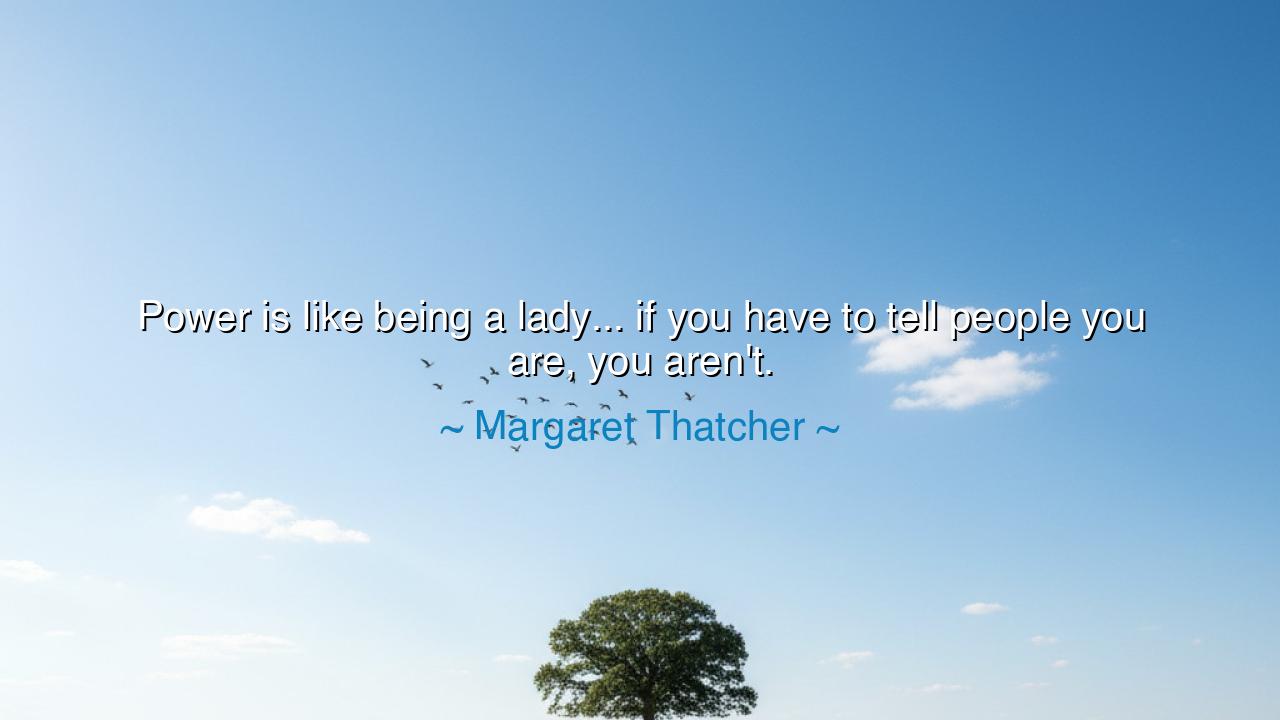
Power is like being a lady... if you have to tell people you






O Seekers of Strength and Sovereignty, hear the words of Margaret Thatcher, a woman whose leadership redefined a nation: " Power is like being a lady... if you have to tell people you are, you aren't." In this sharp and pointed truth, Thatcher reveals the essence of true power: it is not announced, it is not proclaimed, it is simply known. Power is not in the words we speak to assert our authority, but in the actions we take and the respect we command through our very presence. To declare one’s power is a sign of insecurity; true power is unquestioned and undeniable.
Consider, O Children, that in every age, the most powerful figures were those who did not need to boast of their strength or virtue. The greatest leaders, those whose influence endured, did not wear their power as a badge, but carried it like a mantle that others could feel. It is not the loud or boastful who shape the world, but the quiet force that moves with certainty and grace. Just as a true lady does not need to declare her worth, so too does power reveal itself through the actions of those who possess it.
Look to the example of Alexander the Great, whose power was unquestioned across the known world. He did not need to announce his greatness with words; his actions spoke louder than any proclamation. His conquests, his vision, and his ability to lead an empire were enough to make the world bow before him. Alexander did not shout his authority, for he was the living embodiment of power itself. Like Thatcher’s words, his legacy is a testament to the truth that true power needs no explanation—it is seen, it is felt, and it is respected.
And so, O Seekers, understand this profound truth: power does not need to be announced. It is not in the boastful proclamation of our strength that we find respect, but in the quiet confidence that flows from our actions. Power does not shout—it is steady, purposeful, and unshakable. When we walk in the full knowledge of our own worth and capability, others will see our power without us needing to declare it. Let our deeds, not our words, be the testimony to who we are and what we command.
Let us, therefore, walk with the confidence of those who know their own strength. We do not need to shout our worth into the world, for the world will hear us through the silent weight of our actions. True power is not in what we say about ourselves, but in what others see in us and feel in our presence. Let our deeds speak of the power we possess, for power that needs no declaration is the power that lasts. May we be the silent, undeniable force that shapes the world, not through boastful words, but through the quiet confidence of who we are.






MVNguyen Ngoc Minh Van
I see this quote as a reminder that power is often most effective when it’s not overemphasized. The more you try to force others to recognize your authority, the less genuine it seems. But, I wonder—what about situations where it’s necessary to assert power or make a point? Can there ever be a time when it's okay to state your strength, or does that undermine the concept of true power?
KLNguyen Thi Khanh Linh
It’s fascinating how Margaret Thatcher equates power with being a lady, where if you need to say you are, you probably aren’t. It almost makes me wonder if in the modern world, we sometimes mistake confidence for boasting. In leadership roles, is it better to let your work and influence speak for themselves, or is it okay to occasionally assert your authority? How do you think this applies to today’s leaders in politics or business?
MTKhong Minh Toan
This quote really speaks to the idea of power being quiet but present. I can relate it to how confidence works – the more you have, the less you need to prove it. But, is it possible that in some cases, people have power but still feel the need to communicate it to others for different reasons, like self-assurance or to maintain control? How do you balance showing power without seeming desperate for validation?
NDKhoi Nguyen Duc
I find this quote interesting because it reflects on the difference between perception and reality when it comes to power. In a way, it’s like saying that real strength or influence is effortless. But, is it possible for someone to have real power and still feel the need to remind others of it? Or, is that actually a sign of insecurity? I wonder if it’s hard for some people to let go of the need for validation.
QNquang nhat
This quote seems to suggest that true power doesn’t need to be announced or flaunted. It’s subtle but impactful. It makes me think of how some leaders or individuals feel the need to constantly assert their authority, which can sometimes have the opposite effect. If you truly have power, shouldn’t your actions and presence speak for themselves? Do you think there’s a difference between confidence and the need to assert power constantly?